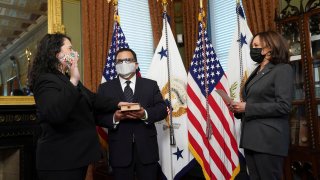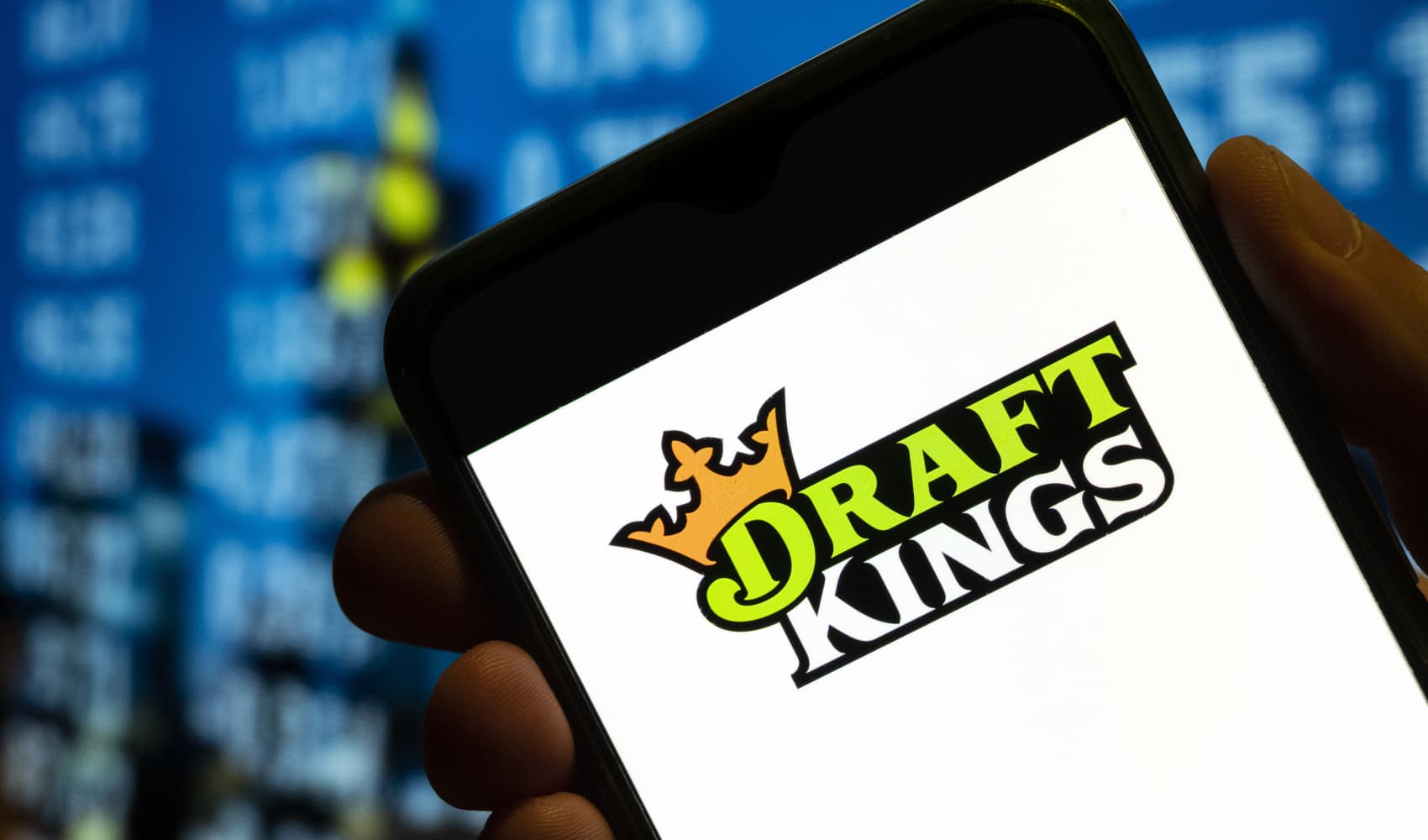
- President Biden's SBA Administrator Isabelle Guzman says it was a "huge scale" change for the federal small business agency to handle $1 trillion in Covid-19 loans, grants and other forms of financial relief.
- While the PPP program and Shuttered Venues Operator Grant program were criticized, the SBA leader says she is forcing SBA staff to think more like entrepreneurs and tech start-ups and solve that scale problem so the agency makes equitable, efficient funding decisions to help small businesses grow.
- Currently she cited remaining funds in the program from live event venues, Covid economic injury disaster loans, and a PPP loan forgiveness process she says is improving with the support of 1,000 partners who can make decisions in 10 minutes.
Isabella Casillas Guzman, the new Administrator of the U.S. Small Business Administration, began her term under President Joe Biden in March, with the responsibility of managing the government's efforts to support the more than 30 million U.S. small businesses. She took over an agency that, because of Covid, experienced a scaling experiment that would make even the most hyper-growth start-ups take note.
"We've scaled from a $40 billion portfolio to over a trillion dollars in relief during Covid," Guzman said at CNBC's Small Business Playbook event on Wednesday.
Guzman is familiar with managing large sums on behalf of the government and entrepreneurs. She worked at the SBA under President Barack Obama and as Director of the California Office of the Small Business Advocate, she oversaw billions in relief grants during Covid for the largest state economy. But a trillion-dollar financial relief machine is on another order, and Guzman tells CNBC there are still opportunities left for businesses to find the support they need to fully come back from Covid and make it through this new delta variant uncertainty phase.
Get top local stories in San Diego delivered to you every morning. >Sign up for NBC San Diego's News Headlines newsletter.
"Now still, they need our support. They need continued relief efforts as well as access to capital and markets to continue to power through this recovery," Guzman said.
While she described broad optimism among small business owners even as they face numerous challenges, she said the Delta variant is creating concerns and "uncertainties on the horizon that could limit their recovery" — a view that is in line with the just-released CNBC | Momentive Q3 2021 Small Business Survey.
Money Report
That is why the SBA has been focused on "trying to continue to get out billions of dollars in relief to our small businesses," Guzman said.
Here are some of the programs the new SBA administrator mentioned that are still available to small businesses.
Ways to get SBA financial relief
While some Covid financial relief plans have been exhausted, Guzman noted that the American Rescue Plan still offers the Shuttered Venues Operator Grant program to support live event venues like stages, museums and theaters.
That program was criticized for the way it dispensed financial relief, and how anti-fraud controls actually denied businesses in need from the help, but Guzman said the SBA has been able to turn around that program. "We have over 10,000 applications approved and over $8.5 billion dollars distributed, as a result of just some strong management within the fraud control," Guzman said. "So we feel strongly that we can balance both and still get those funds into those hands of those intended businesses."
In addition, the Covid Economic Injury Disaster Loan program remains available, which she described as both a loan program as well as an advanced grant program for those hardest hit low-income businesses, featuring fixed, long-term, low interest debt.
That allows for businesses to position themselves with capital to take advantage of growth opportunities, or just position their businesses to recover post-Covid, Guzman said. She added that the SBA is trying to ensure that it is streamlined and accessible to more businesses during this period.
Helping pandemic era start-ups
One of the surprises of the pandemic is that many Americans took it as an opportunity to start a new business, whether they were older Americans pushed out of corporate careers or those just starting out in the workforce during a crisis.
Guzman said one of the lesser known roles that the SBA plays is through small business investment companies (SBICs), privately owned companies licensed and regulated by the SBA which make debt and equity investments in small businesses. The SBA provides its guaranteed funding to SBICs across sectors and industries, which then make investments in businesses.
She said the SBA work with SBICs is an area where she wants to do more. "We're looking through the president's Build Back Better agenda to create new SBIC programs, as we call them for venture and micro, as we look to power this next recovery phase and business opportunity," Guzman said.
In addition, grants through the Small Business Innovation Research program and the SBA are also an option that Guzman said start-ups should know about. These grants are designed to connect start-ups working on ideas that could be funded by the federal government for core R&D before they are at the commercialization stage of a business.
"Small Business Administration is here with a host of services for both start-ups, innovative technology, science based start-ups, as well as small businesses from Main Street to manufacturing, with core programs around capital market access and networks to build your team," she said.
PPP problems, loan forgiveness in 10 minutes
While the Paycheck Protection Program was a lifeline for many businesses that had to shut down during Covid, it was also mired in criticism for an inequitable approach to how it made loans.
The daughter of a small business owner and entrepreneur herself, Guzman said she learned growing up in a small business family that understanding your customers' needs is a dominant issue for business survival, and the SBA needs to think that way as well.
"For the SBA, our customers, we need to make sure that we are being customer-centric, and serving our businesses. That means there's a changing face of entrepreneurship with women, and people of color starting businesses at such high rates, as well as a need for all of us to better serve those businesses, connect them to resources," she said.
The SBA recently launched its direct forgiveness portal, with a focus on small businesses who have PPP loans of $150,000 and under. Guzman said the SBA has partnered with over 1,000 lenders on this platform for businesses to be able to complete the process for forgiveness on their loans in 10 minutes.
"Over 94% of the loans that remain unforgiven are with these small businesses, and we want to make sure that we can support them, as well as our large lender network, to be able to process these PPP forgivable loans," she said.
Gender, race and business recovery
Start-ups that Guzman said may be in particular need of help are those run by female and minority founders.
"What we found, especially during Covid, is that women and people of color are oftentimes faced with more intense challenges and trying to access those resources to either position their businesses for recovery or start up," Guzman said. "We need to make sure that we're meeting businesses where they are, taking into account the challenges that they've had to overcome over the past year and a half, and be ready with programs that can serve them today."
She said creating a network of community navigators, funded through the American Rescue Plan, will help connect local businesses to SBA programs. Adopting new technology to help handle the massive change in scale for the agency from $40 billion to $1 trillion will also be a big part of making the SBA run more effectively, she said.
The labor shortage, Covid and small business
SBA financial relief and help accessing capital have helped small businesses facing a difficult labor market as they attempt to get back to full speed, but Guzman said many of the conversations she is having with small businesses owners show that Covid concerns remain a big part of the labor shortage, not simply competition over wages and benefits.
"They're letting me know that there's still concerns about Covid. And especially with the Delta variant," she said.
The National Federation of Independent Businesses is seeing the labor shortage translate into lost sales among it member companies, said Holly Wade, NFIB executive director of research, citing data from its latest Covid survey. Also speaking at CNBC Small Business Playbook, she said the combination of continued competition against larger firms in the hiring market and the rise of delta variant means small businesses will continue to be challenged to keep sales up. "The lost sales that they have seen, we may see it again," Wade said.
Through the American Rescue Plan, businesses are able to give their employees time off to get vaccinated and recover and access a tax credit especially built into the federal Covid relief plan for them. "That, above all, is what they're concerned with. They want their main streets and their business centers to return to normal. And that means we have to fight the pandemic," Guzman said.
The CNBC | Momentive Q3 2021 Small Business Survey found difficulty hiring among the top challenges for small business owners, with wages and benefits increasing in the attempt to keep workers and recruit new staff.
Uncertain outlook for restaurant relief
Restaurants, in particular, have faced both labor shortages and concerns about the delta variant.
Guzman said the federal Restaurant Revitalization Fund, created through the American Rescue Plan, provided $28.6 billion in funding to over 100,000 businesses, but she added that the demand was 2.5 times that amount.
"There are still restaurants, food and beverage businesses out there who need support; we know they were the hardest hit, and are oftentimes going to be the last to reopen in communities, yet they define so many of our main streets," she said.
Legislation has been introduced on Capitol Hill three times since the original authorization was depleted in July to add new funding for restaurants, including most recently an effort by senators last weekend, but no legislative effort has yet been successful.
Guzman said she could not comment on any actions Congress may take to further support the food industry.
NFIB's Wade said new funding for restaurants is something that the trade group is looking at right now, but she stressed that small businesses should take advantage of what exists today. She pointed to the Employee Retention Tax Credit, which she said many small business owners don't know about. It provides a tax credit based on wages paid to employees, up to $33,000 per employee. "It's a bit technical to navigate, but for many, they will qualify. Small business owners should certainly look into it," she said.
Paychex CEO Marty Mucci recently told Jim Cramer on CNBC"s "Mad Money" that it had processed over $3 billion worth of employee retention tax credits, "which is cash in their pocket to help them out right now."
The Senate's $1 trillion infrastructure package would end the employee retention tax credit three months early, on Oct. 1 instead of Jan. 1, 2022.






